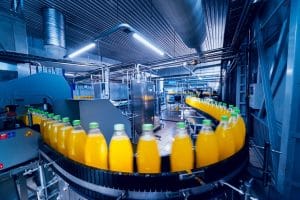 In most industries, electrical thermal management plays a vital role in the equipment that companies rely on to remain operational. In some industries, however, thermal management plays a bigger role in much more than just cooling control panels and other electrical enclosures. For example, in the food and beverage industry, the ability to control and transfer heat is essential to everything from production and processes such as pasteurization and sterilization, to the safe packaging and shipping of most food and beverage products. With the help of modern, often customized heat exchangers, each of these processes can be made much simpler and more efficient.
In most industries, electrical thermal management plays a vital role in the equipment that companies rely on to remain operational. In some industries, however, thermal management plays a bigger role in much more than just cooling control panels and other electrical enclosures. For example, in the food and beverage industry, the ability to control and transfer heat is essential to everything from production and processes such as pasteurization and sterilization, to the safe packaging and shipping of most food and beverage products. With the help of modern, often customized heat exchangers, each of these processes can be made much simpler and more efficient.
The efficiency of food production equipment
Much like any other industry, food and beverage companies rely on advanced technology to facilitate most of their processes and ensure optimal safety and productivity. As in other industries, implementing heat exchangers to properly cool this technology has helped many food and beverage producers significantly streamline the electrical thermal management of this technology. This means virtually every aspect of their operations is more efficient and reliable thanks to heat exchangers’ consistently high-performance thermal management capabilities. As operations become more efficient and reliable, companies are able to dedicate more resources to improving and maintaining the quality of their products.
Automating many of the processes
Automation is one of the more significant technological advances in most industries today, and food and beverage companies are no exception. The ability to automate redundant processes helps make overall operations more efficient in several ways, such as freeing up time for employees to focus on higher-level tasks and eliminating downtime for certain applications. In addition to their high level of efficiency, heat exchangers are also tightly sealed and safe enough for sensitive applications such as food and beverage production.
A cost-effective and eco-friendly production line
The different advantages that heat exchangers provide today’s food and beverage companies are many, but their ability to make each company’s operations more cost-effective and eco-friendly have been the most significant. Heat exchangers don’t require large amounts of energy as conventional solutions, such as air conditioners, typically do. They also utilize safe, eco-friendly cooling fluids, such as water, that help ensure a more than adequate level of environmental friendliness.
For more information about how heat exchangers can impact food production, call Noren Thermal Solutions in Taylor, TX, at 866-936-6736.







